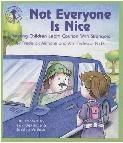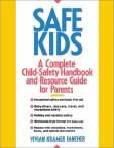Stranger Danger: Abducted Children and Grabbers
You are at the local grocery store and you have your 5 year old daughter Jenny with you. You are standing at the deli counter asking about the sliced deli meat with Jenny at your side. As you put your purchase in your cart, you notice your daughter is gone.
In a panic you call out and look for her, but she’s nowhere to be found. Someone tells you that they saw a little girl matching Jenny’s description walk out of the store with her “Daddy” a few minutes ago.
Typically, strangers who kidnap children commit their crimes with intent to harm their young victims. In nearly 80 percent of non-family child abductions cases, the victim is sexually or physically assaulted, and 40 percent are killed.
Every day, these predators lure unsuspecting children into vehicles and homes. Most kids are not prepared for the reality of "stranger danger" and therefore, tend to trust unknown adults.
Most abducted children are eventually recovered. The majority of these children return home with visible or emotional scars. A small number of kidnapped children are never located. And, in rare cases, are murdered by the stranger who betrayed their trust.
There are two areas that you need to address in order to protect your children. Teach your children how to be safe, and keep a child safety kit in case your child is taken or missing.
Roles and Boundaries:
Teach your children what roles are appropriate for the people in their lives. Knowing what is “normal” and what is not, is very important when your child interacts with friends, family, neighbors, and even educators.
Explain what boundaries apply to these people. Your child’s teacher is there to teach, not to take your child to the candy store after school.
Teach your child to be rude. It is unfortunate, but in this day it is necessary for kids not to be too polite. Children are taught to respect their elders, to say please and thank you, and to be polite. Predators use this to their advantage. If they can get within grabbing distance of your child, they will take them. Teach your child to keep a safe distance from strangers.
Make up a SECRET WORD that only you and your child know. Change this word about once a month and tell no one what it is. This is a word that you would give to someone if they needed to pick your child up. By knowing the Secret Word, it proves to your child that you really did authorize this person to take care of your child.
Talk about the lures that predators use to distract kids and get them to trust them.
Common lures used are:
Asking for help- Abductors often ask for help from a child, maybe carrying some packages, help in finding a lost pet, or even just asking a question. Children should be taught that adults ask other adults for help, not children. Children should be cautious of situations in which the adult has arranged to be alone with them.
Posing as an Authority Figure- Posing as a policeman, fireman, or anyone in any type of uniform would be considered an authority figure to children. Teach your child that they have the right to question authority. The predator may tell the child they are arresting them. Handcuffs have even been used with older children. The intent of these ploys is to remove the child from the normal safe area which means "other people."
Promising- Predators may promise to take children to their parents, or say that their parents sent them. Tell your child to use your SECRET WORD. If the stranger does not know the secret word, then they know that Mom and Dad did not send them and it’s not safe to go with them.
Emergency- Claiming that an emergency has happened- “Your Mom was in a bad accident and your Dad sent me to pick you up and take you to them.” Once again, your child should ask the stranger what the SECRET WORD is.
Job Offer- Sometimes an abductor will use the offer of a job to lure children. Babysitting is the most common lure. Tell your kids that if someone approaches them with a job offer, that they can’t go with them in their car or into their home. The purpose of this lure is to get your child away from friends and public places.
Force or Fear- An abductor may try to force your child to go with them by using threats or a weapon. Tell your child that as long as they remain in the public place (mall, parking lot, store) they are safe. They are not to go with the abductor. Once the abductor has them alone they can control them and the situation. Tell your child to yell for help and say “This is not my Father/Mother”.
Giving Gifts- Candy is most often used, but with older kids beer or drugs may also be used as a lure. Question all gifts that your child brings home, even if they are from another family member. This may be a sign of grooming. Please read our grooming articles here.
Photographer- Often a predator will approach a child and tell them that they are a photographer or agent. They may even give them a business card. They want to lure the child away by offering praise and compliments- “you’re beautiful, you should be in magazines or on television.”
Teach your children their full name and yours, phone number with area code, and address with zip code. They should know how to make local and long distance calls; use a pay phone; call home and law enforcement departments; and dial "0" for the operator or 911 in an emergency.
Mentally note the clothes your children wear EVERYDAY! Avoid putting names visibly on clothing or belongings.
Make a child safety kit that includes your child’s fingerprints, recent photograph, hair sample for DNA, and your child’s personal information. You can go here to get a free child safety kit from the Polly Klaas Foundation.
Please see our article on What To Do If Your Child is Missing.
In a panic you call out and look for her, but she’s nowhere to be found. Someone tells you that they saw a little girl matching Jenny’s description walk out of the store with her “Daddy” a few minutes ago.
Typically, strangers who kidnap children commit their crimes with intent to harm their young victims. In nearly 80 percent of non-family child abductions cases, the victim is sexually or physically assaulted, and 40 percent are killed.
Every day, these predators lure unsuspecting children into vehicles and homes. Most kids are not prepared for the reality of "stranger danger" and therefore, tend to trust unknown adults.
Most abducted children are eventually recovered. The majority of these children return home with visible or emotional scars. A small number of kidnapped children are never located. And, in rare cases, are murdered by the stranger who betrayed their trust.
There are two areas that you need to address in order to protect your children. Teach your children how to be safe, and keep a child safety kit in case your child is taken or missing.
Roles and Boundaries:
Teach your children what roles are appropriate for the people in their lives. Knowing what is “normal” and what is not, is very important when your child interacts with friends, family, neighbors, and even educators.
Explain what boundaries apply to these people. Your child’s teacher is there to teach, not to take your child to the candy store after school.
Teach your child to be rude. It is unfortunate, but in this day it is necessary for kids not to be too polite. Children are taught to respect their elders, to say please and thank you, and to be polite. Predators use this to their advantage. If they can get within grabbing distance of your child, they will take them. Teach your child to keep a safe distance from strangers.
Make up a SECRET WORD that only you and your child know. Change this word about once a month and tell no one what it is. This is a word that you would give to someone if they needed to pick your child up. By knowing the Secret Word, it proves to your child that you really did authorize this person to take care of your child.
Talk about the lures that predators use to distract kids and get them to trust them.
Common lures used are:
Asking for help- Abductors often ask for help from a child, maybe carrying some packages, help in finding a lost pet, or even just asking a question. Children should be taught that adults ask other adults for help, not children. Children should be cautious of situations in which the adult has arranged to be alone with them.
Posing as an Authority Figure- Posing as a policeman, fireman, or anyone in any type of uniform would be considered an authority figure to children. Teach your child that they have the right to question authority. The predator may tell the child they are arresting them. Handcuffs have even been used with older children. The intent of these ploys is to remove the child from the normal safe area which means "other people."
Promising- Predators may promise to take children to their parents, or say that their parents sent them. Tell your child to use your SECRET WORD. If the stranger does not know the secret word, then they know that Mom and Dad did not send them and it’s not safe to go with them.
Emergency- Claiming that an emergency has happened- “Your Mom was in a bad accident and your Dad sent me to pick you up and take you to them.” Once again, your child should ask the stranger what the SECRET WORD is.
Job Offer- Sometimes an abductor will use the offer of a job to lure children. Babysitting is the most common lure. Tell your kids that if someone approaches them with a job offer, that they can’t go with them in their car or into their home. The purpose of this lure is to get your child away from friends and public places.
Force or Fear- An abductor may try to force your child to go with them by using threats or a weapon. Tell your child that as long as they remain in the public place (mall, parking lot, store) they are safe. They are not to go with the abductor. Once the abductor has them alone they can control them and the situation. Tell your child to yell for help and say “This is not my Father/Mother”.
Giving Gifts- Candy is most often used, but with older kids beer or drugs may also be used as a lure. Question all gifts that your child brings home, even if they are from another family member. This may be a sign of grooming. Please read our grooming articles here.
Photographer- Often a predator will approach a child and tell them that they are a photographer or agent. They may even give them a business card. They want to lure the child away by offering praise and compliments- “you’re beautiful, you should be in magazines or on television.”
Teach your children their full name and yours, phone number with area code, and address with zip code. They should know how to make local and long distance calls; use a pay phone; call home and law enforcement departments; and dial "0" for the operator or 911 in an emergency.
Mentally note the clothes your children wear EVERYDAY! Avoid putting names visibly on clothing or belongings.
Make a child safety kit that includes your child’s fingerprints, recent photograph, hair sample for DNA, and your child’s personal information. You can go here to get a free child safety kit from the Polly Klaas Foundation.
Please see our article on What To Do If Your Child is Missing.









